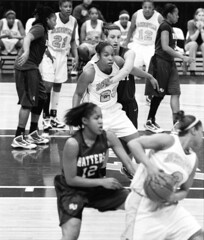 Truth be told: when I first started blogging here and I wrote down a bunch of categories that I thought I would write about, I thought I would have a harder time writing articles that weren’t about sports. Today’s post will be my 10th in the sports category, which is still 7 behind the entertainment and history categories (both have 17 each), and last among the 11 categories here at Genuine Thriving.
Truth be told: when I first started blogging here and I wrote down a bunch of categories that I thought I would write about, I thought I would have a harder time writing articles that weren’t about sports. Today’s post will be my 10th in the sports category, which is still 7 behind the entertainment and history categories (both have 17 each), and last among the 11 categories here at Genuine Thriving.
Six or seven years ago, I was at a sports lounge watching one of my favorite teams play. There was something different this time, though. Instead of watching my team on the “home” network where I usually watched them, I was watching them on the network of the other team. At first, this might not seem like anything special, but as I continued to watch the game on this network, I noticed something: a home-team bias. The odd thing: it wasn’t a bias for ‘my’ team.
It was a home-team bias for the “other” team. And it was pretty blatant, too. There was a controversial call (and it was really close), but the announcers were saying that it was an “easy” call in favor of their team. At first, I was a little surprised that they could be so biased. I always thought that announcers were supposed to be “unbiased” or at least not display their biases, while on-air.
A little while back, I wrote about biases. The quote to start that post was from a scientist who has won a Nobel prize for his work in this area: “You will learn from others around you being skeptical more than you will learn by becoming skeptical.”
 This may take a bit of abstraction, but let’s think about how we can apply this to the scenario of watching your favorite team from the ‘other’ side. Typically, the announcers for your favorite team will develop a relationship with the players on said team. When announcing, they may display (unintentional) biases towards your team. However, if you were watching on the other team’s network, the announcers just might see things that the home-team announcers won’t (because of their biases).
This may take a bit of abstraction, but let’s think about how we can apply this to the scenario of watching your favorite team from the ‘other’ side. Typically, the announcers for your favorite team will develop a relationship with the players on said team. When announcing, they may display (unintentional) biases towards your team. However, if you were watching on the other team’s network, the announcers just might see things that the home-team announcers won’t (because of their biases).
I realize that it’s not always possible (or easy) to get a hold of the opposing team’s broadcast of the game. However, I would encourage you to try it once or twice. The first few times I did it, I learned some interesting things about ‘my’ team. Why? Mostly because announcers like to supply “interesting facts” about the opposing team. As a result, I learned things about ‘my’ team that I wouldn’t have ever heard had I only ever listened to the regular broadcast.
I know that for some sports, this really isn’t possible. For American football, the games are usually nationally televised on either FOX or CBS, so there isn’t a blatant bias by the announcers for one team or the other. However, for sports like hockey, baseball, and basketball, there are usually local broadcasters for the game.
Filed under: Perspective, Sports Tagged: Idea, Team
